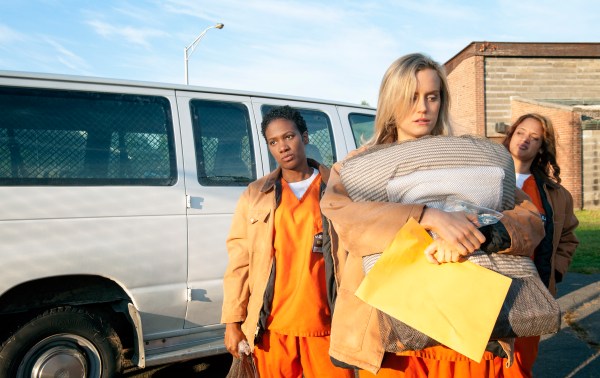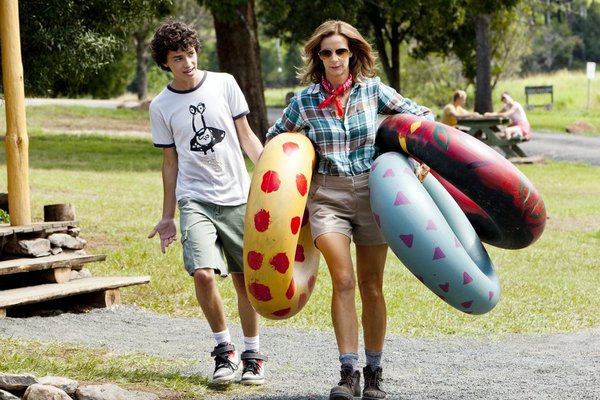I’m on vacation, but summer TV isn’t; this week sees the debuts of three of the most promising new shows to launch this season, on cable, network, and streaming TV. Given the timing, I wasn’t able to do full-blown reviews of each series before taking off, and hopefully I’ll write more about each show on Tuned In after I’m back. In the meantime, here are three very different new series you may want to book some time for in the dog days:
THE BRIDGE (FX, premieres July 10)
TV does not exactly lack for serial killers right now (Dexter, Hannibal, The Following, &c), so I wouldn’t blame you for wondering if this drama, set on the US-Mexico border, had anything new to add to the Rio Grande of blood. But what’s most compelling about The Bridge is that it emphasizes not the psychology or forensics of the case but its context. It opens with the investigation of a murder that begins smack on the border between El Paso and Juarez, Mexico, drawing in police from both countries. The show uses the initial murder, of a white-collar professional Texas woman, to bring in the real-life mystery of the Dead Girls of Juarez, hundreds of young women who have been going missing in the Mexican border town–often to the flagrant indifference of officials.
The case brings together a mismatched pair of sleuths. Sonya Cross (Diane Kruger), an American detective with pronounced Asperger’s syndrome, is keenly focused on her work but has a hard time with social cues and nuances. She ends up working with Marco Ruiz (Demian Bechir), a Mexican cop incensed by the Juarez killings and the higher-ups who would rather accommodate the drug cartels than investigate.
It’s a twist on an old cop-story formula, i.e., the stickler for regulations (a side effect of her condition) paired with a cop who works in the gray areas (an outgrowth of professional necessities in his department). The Bridge, true to its name, is a story of two opposite worlds coming together; as a mysterious caller, possibly connected to the crime, points out, “Why is one dead white woman more important than so many dead just across the bridge? How long can El Paso look away?”
ORANGE IS THE NEW BLACK (Netflix, debuts July 11)
The last series Jenji Kohan created was Weeds, a dramatic comedy about a mild-mannered middle-class woman who get mixed up in the drug trade. Her new series is a comedic drama about a mild-mannered middle-class woman who gets mixed up in the drug trade. But while Orange is similar in premise, it’s different–and at least potentially better–in its willingness to look beyond its “What’s a nice girl like you doing in a prison like this?” story hook.
A decade ago, Piper Chapman (Taylor Schilling) carried drug cash from Bali for an ex-lover (Laura Prepon), in an episode of romantic, smitten recklessness. Since then, she’s gone straight, legally and sexually; she’s now engaged to Larry (Jason Biggs) and living a boho-bourgois life making artisanal soap in Brooklyn. But she’s ratted out and convicted shortly before the statute of limitations expires, and sent to a women’s prison in upstate New York.
“This isn’t Oz,” the warden advises her, and neither is Orange, based on a memoir by Piper Kerman. With less-horrific stakes and less violent criminals, it focuses less on the brutality of prison than its sociology. Through Piper, we’re initiated into the prison’s rituals (you refer to yourself by last name only), its culture (including the racial self-segregation of many inmates), its dangers (she learns quickly not to offend the prison cook), and its indignities (the inmates have to clean their cells with maxi pads).
Piper’s our entree to prison life–a little like Tobias Beecher in Oz–and early on the show relies, maybe too heavily, on the idea that she’s not the sort of person who’s supposed to be in jail. (One of her main worries before going in is that Larry not watch Mad Men without her.) But the show becomes more engrossing as is spins out from her story, fleshing out the inmates, their backstories, and their alliances. You may come for the culture-clash cringe-comedy; it’s the real human stories that will have you captivated.
CAMP (NBC, premieres July 10)
One genre that hasn’t benefitted enough from TV’s new golden age (or whatever metal you want to assign to it) is the teen drama. We have the rare pleasure like Switched at Birth or the lost-in-limbo Bunheads, but if only the business expended half the energy trying to make the next Freaks and Geeks that they did trying to make the next Sopranos or Walking Dead.
Camp is not that show: that is, this Australian-made dramedy, set at a financially struggling summer camp, is not the Apatovian/Fiegian, heartbreakingly funny version of itself that I wanted it to be. It has a definite sheen of network-TV polish, it relies a lot on standard elements like love triangles and snotty popular kids, and everyone is about three notches prettier than anyone you likely remember going to camp with.
But the show, starring Six Feet Under’s Rachel Griffiths (as the camp manager going through a divorce from her husband/business partner), has sweetness and good-hearted humor. As the mosquitos and hormones fly at Camp Little Otter–a broken-down, dated camp in an age of swank specialized retreats—Camp itself reveals a kind of throwback charm, recalling the kind of ’70s and ’80s summer-movie comedies (like camp classic Meatballs) that had pathos and real-life problems beneath their water-balloon fights. At a time when network dramas have gotten more and more brooding (see NBC’s Hannibal), Camp makes for a welcome vacation.




